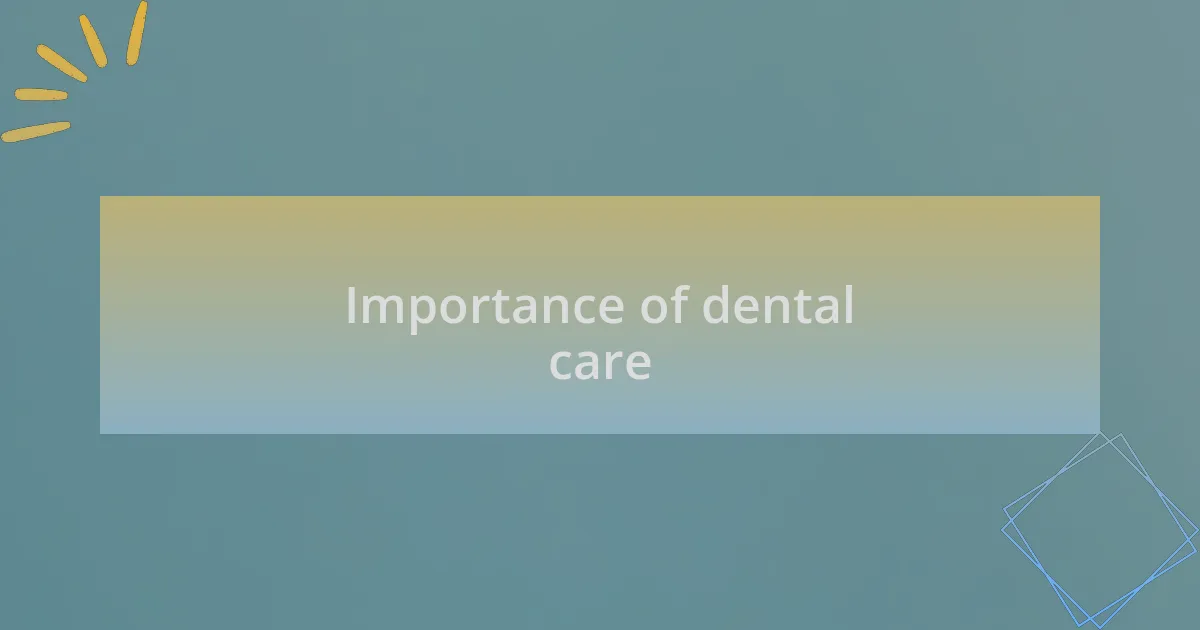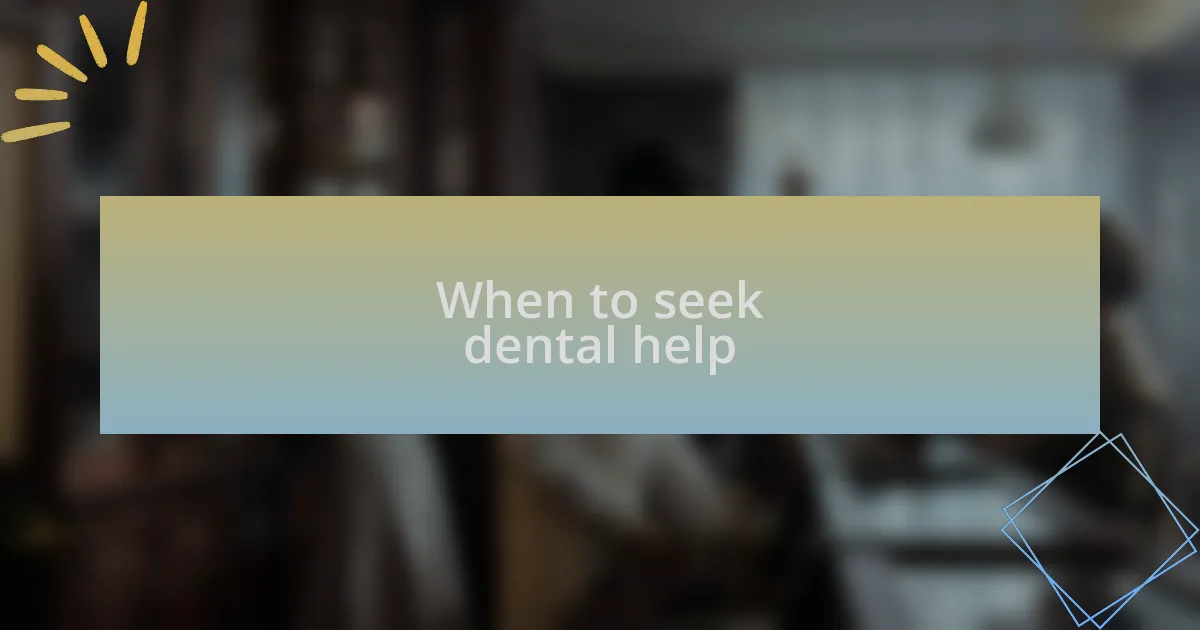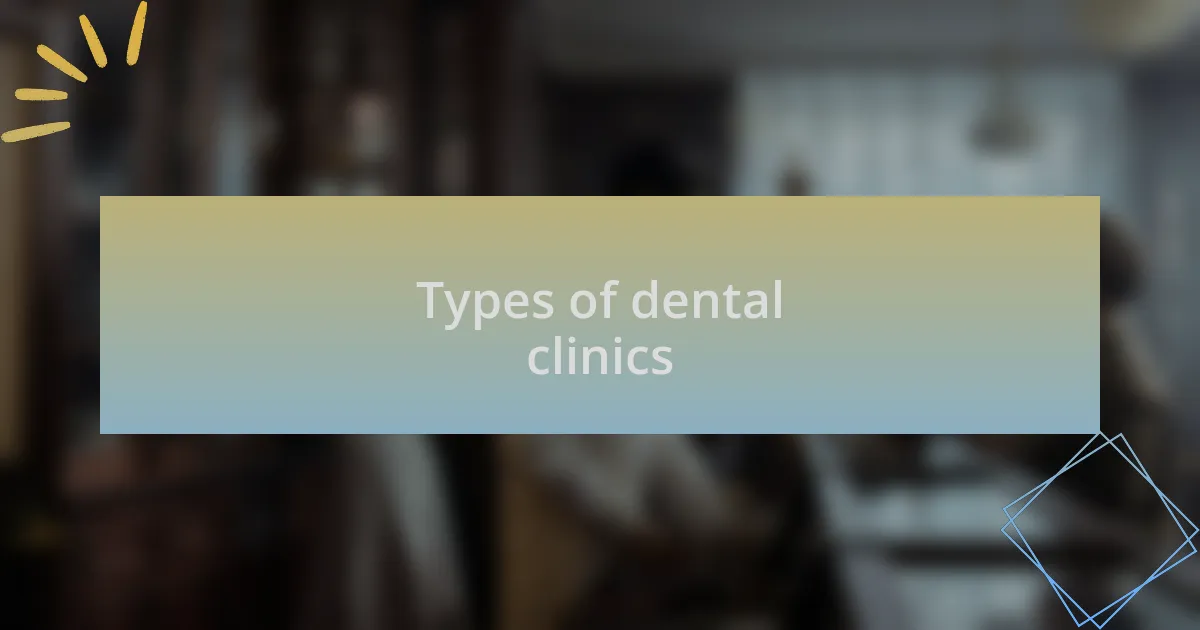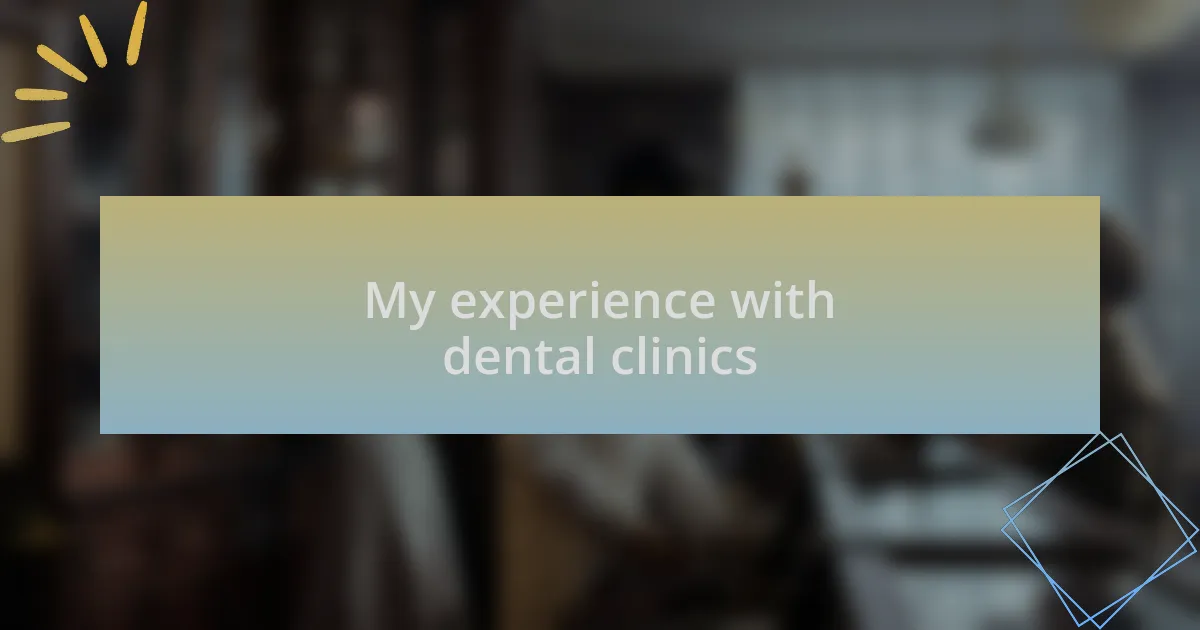Key takeaways:
- Tooth pain can arise from causes like cavities, gum disease, and sensitivity; understanding these helps in seeking timely dental care.
- Regular dental care is essential not only for oral health but also for overall well-being, preventing more serious health issues.
- Recognizing symptoms such as persistent pain, bleeding gums, and sudden sensitivity can indicate the need for professional dental help.
- Different types of dental clinics cater to varied needs, with specialized clinics and emergency services available for urgent care.

Understanding tooth pain causes
Tooth pain can arise from a variety of causes, and understanding these can be crucial in addressing the discomfort. For instance, I once experienced a sharp throb that left me wondering if I had bitten down too hard on something. Turns out, it was a cavity slowly getting worse, a stark reminder of the importance of regular dental check-ups.
Another common culprit is gum disease, which I learned about when my gums felt tender and swollen. It was alarming to realize that neglecting my oral hygiene could lead to such pain. Have you ever felt a dull ache that seemed to linger? Often, this can be linked to inflammation in the gums, signaling deeper issues that need attention.
In my experience, tooth sensitivity can also lead to unexpected pain, especially when enjoying something hot or cold. I vividly remember the shock of using ice cream as a treat only to be met with a jolt of pain that reminded me to be kinder to my teeth. Understanding the root cause of tooth pain can empower us to make better choices and seek help before the discomfort escalates.

Importance of dental care
Dental care is not just about maintaining a bright smile; it plays a vital role in our overall health. I remember when I neglected regular cleanings, thinking it was just a minor inconvenience. Then, I faced a cascading effect of issues, culminating in a root canal. That experience really drove home the point: preventive care is always easier and less painful than reactive treatment.
I have often wondered how many people underestimate the importance of flossing. A simple daily routine can significantly reduce the risk of gum disease, which I learned the hard way when I had to deal with the painful aftermath of skipping it. It’s fascinating to think that investing just a few minutes each day can save us from discomfort and costly procedures later.
Moreover, the connections between oral health and systemic conditions like heart disease or diabetes are staggering. I was surprised to learn that what happens in our mouths can impact our overall well-being. It’s a compelling reason to prioritize dental hygiene and regularly visit a dentist, ensuring we don’t just address symptoms but foster long-term wellness. Have you ever considered how your oral habits might affect your overall health?

When to seek dental help
Recognizing when to seek dental help can be challenging, but some symptoms should never be ignored. For instance, I remember a time when I felt a dull throb in my tooth, thinking it was just a temporary annoyance. It turned out to be an infection that, if left untreated, could have led to more significant complications. If you’re experiencing persistent pain or swelling, it’s time to schedule that dental appointment.
Another sign that shouldn’t be brushed aside is bleeding gums. I often dismissed it as a result of vigorous brushing until it became a chronic issue. This experience taught me that bleeding gums can be an early indication of gum disease, which is serious and requires professional intervention. If you find blood on your toothbrush or dental floss, don’t hesitate to get checked out; your gums are asking for help.
Finally, if you notice sudden sensitivity to hot or cold, that could signal an underlying problem, like a crack or decay. I vividly recall when my morning coffee suddenly felt like a shock to my teeth. It was my body’s way of telling me that something was off. So, when in doubt, trust your instincts—if something feels wrong, it probably is, and seeking dental help could save you from a lot of pain down the road.

Types of dental clinics
When it comes to types of dental clinics, it’s fascinating to see the variety available, each catering to different needs. For example, I once wandered into a family dental clinic, expecting a routine cleaning. To my surprise, they also provided comprehensive services, from pediatric dentistry to orthodontics, ensuring families could find everything under one roof. Isn’t it comforting to know that a single visit can cover your children’s dental needs alongside your own?
On the other hand, specialized clinics focus on specific areas of dental care, such as oral surgery or cosmetic dentistry. I personally visited a cosmetic dental clinic where they not only addressed my tooth pain but also provided options for enhancing my smile. There’s something empowering about walking into a place that specializes in the exact treatment you need. Have you ever had a dental procedure that transformed your confidence?
Lastly, emergency dental clinics are a lifesaver when pain strikes unexpectedly, like when I experienced a sudden toothache late at night. I remember frantically searching for a clinic that could help me, and finding one that was open and ready to assist was a relief. These clinics are designed for urgent situations, ensuring that you are not left in agony while waiting for standard appointments. Isn’t it reassuring to know that relief is just a phone call away in times of crisis?

My experience with dental clinics
My experiences with dental clinics have been quite varied, each visit leaving me with different emotions. I still remember walking into a local clinic for a check-up and being greeted with warmth and professionalism. It made a world of difference to feel welcomed; it eased my anxiety about dental work. Have you ever noticed how a friendly staff can change your entire outlook on your visit?
Another time, I sought help at a dental clinic during a particularly stressful week, and I was amazed at how efficiently they managed my appointment. I arrived feeling tense but left relieved, not just because of the treatment but because the staff listened to my concerns. It was a reminder of how crucial it is for dental professionals to connect with their patients on a personal level. Have you ever felt that a simple conversation with your dentist could ease your worries?
On a contrasting note, I visited a more corporate dental clinic once, where I felt like just another number in the system. While they provided excellent care, I missed the personal touch. It made me realize that while competency is important, the emotional aspect of care can significantly impact our overall experience. How do you prefer to feel when you walk into a clinic: as a valued patient or just another appointment on the schedule?

Methods for quick relief
One method I found extremely effective for quick relief from tooth pain was using a cold compress. I remember the throbbing pain was nearly unbearable, so I grabbed an ice pack and applied it to the outside of my cheek. The numbing sensation not only eased the pain but also reduced swelling, providing me with a much-needed respite. Have you ever noticed how something as simple as ice can work wonders?
Another technique I relied on was rinsing my mouth with warm salt water. Initially, I was skeptical, but after a few swishes, I felt significant relief. The warmth soothed my gums while the salt acted as a natural antibacterial agent, which is invaluable when dealing with dental discomfort. Have you tried this method before? It’s definitely worth exploring, especially when the pain hits unexpectedly.
Lastly, clove oil became my go-to remedy. Just a few drops applied directly to the painful area provided instant relief. I was surprised by how effective this natural solution was, considering I had always assumed only medications could alleviate such pain. Have you ever used clove oil for toothaches? It’s fascinating how nature can offer solutions that sometimes outshine conventional methods.